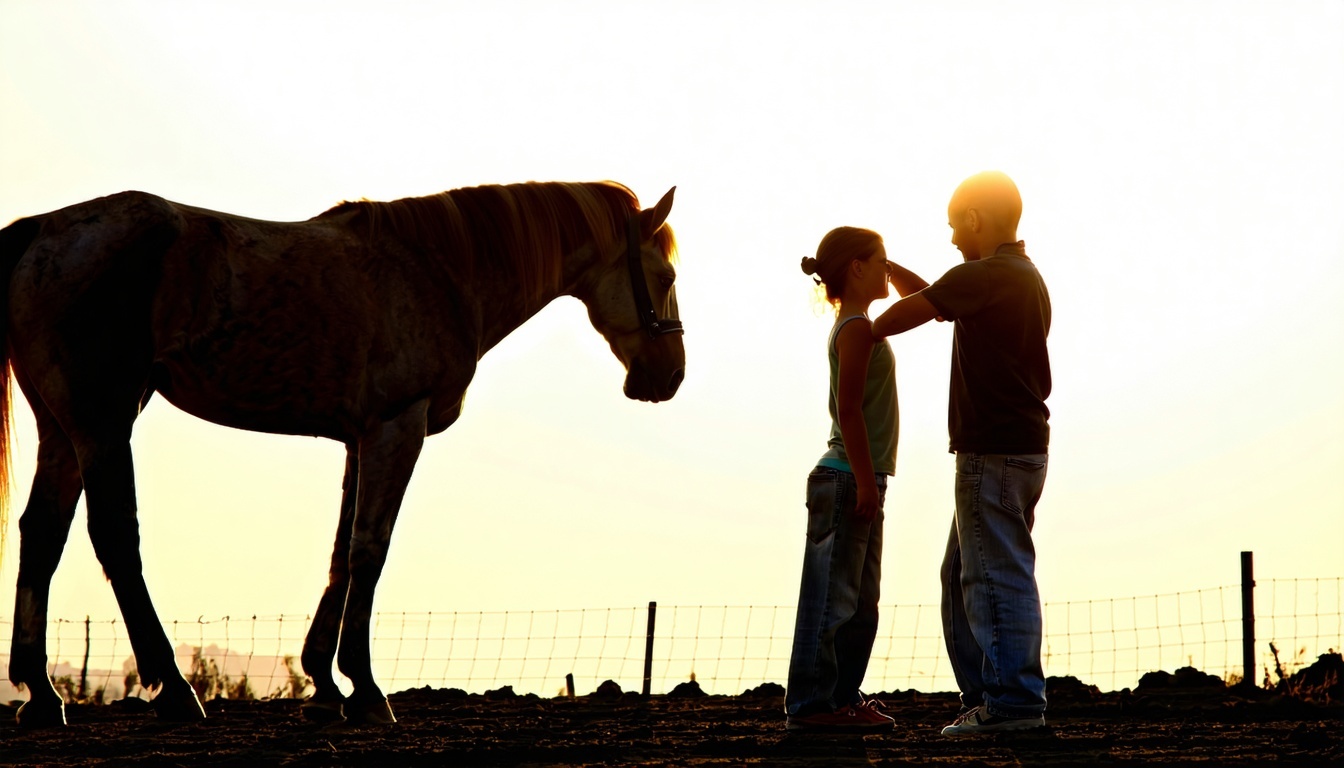
There’s a moment, just before your foot finds the stirrup, when the world hushes. You place your hand on the horse’s neck—feel the warmth, the breath, the life beneath the skin. In that instant, you’re not in charge. You’re in partnership. That’s the first lesson horses teach us: healing doesn’t come from control—it comes from connection.
I’ve loved horses since before I could spell “trauma.” As a child, I collected My Little Ponies and Breyer models, always dreaming of the real thing. By third grade, my best friend Michelle had a horse named Sonny. Every Christmas, I asked Santa for one of my own. He never came through—but eventually, I found ways to ride anyway.
Later, after moving to Arizona, I leased a horse and rediscovered that feeling—freedom, yes, but more than that: presence. When you’re riding a horse, you’re not scrolling. You’re not ruminating. You’re not forecasting worst-case scenarios. You are—utterly and completely—here. Because the horse is.
And that’s where this story connects with the work I do now as a psychiatric nurse practitioner. Because trauma pulls us out of the moment, out of our bodies, and away from connection. But horses? Horses bring us back.
Trauma Doesn’t Trust Easily
People who carry trauma often learn one core lesson: it’s not safe to trust. Whether that trauma came from relationships, institutions, loss, or neglect, it often leaves behind a nervous system stuck in defense mode. Hypervigilance, avoidance, emotional shutdown, dissociation—these aren’t character flaws. They’re brilliant survival strategies.
But they make healing tricky. You can’t rush trust. You can’t demand it. And you certainly can’t fake it—not with people, and definitely not with horses.
If you try to climb on a horse you haven’t connected with, chances are the ride won’t go well. Horses pick up on every flicker of tension in your body, every whisper of hesitation in your voice. They respond not to what you say—but to what you feel. And in that way, they reflect something back to us that’s deeply, beautifully honest.
Horses and the Nervous System
There’s a reason equine-assisted therapy has gained recognition in trauma treatment. Horses, like humans, are herd animals. They’re wired for connection and safety. But unlike humans, they live fully in the present moment—no shame about yesterday, no anxiety about tomorrow. Just breath, movement, and alert awareness.
What’s fascinating is that horses also emit a much larger electromagnetic field from their hearts than humans do. This isn’t woo—it’s measurable science. The HeartMath Institute and others have documented how being near a horse can regulate a human’s heart rate and reduce cortisol levels. Simply standing beside one can help calm your nervous system.
It’s not magic. It’s co-regulation. It’s nervous systems syncing in silence.
From Barn to Therapy Room
So, what do horses actually teach us about trauma recovery?
They remind us that:
-
Trust is earned, not demanded.
-
Presence is more powerful than performance.
-
Emotional safety is a felt sense, not a checklist.
-
Healing happens in relationship—not isolation.
In my work with clients, I carry these lessons into every session. I may not have a horse in the room—but I bring that same calm, grounded, attuned energy. I listen with more than my ears. I watch posture, pacing, tone, and even breath. Because trauma is held in the body—and healing happens when we feel safe enough to let it move.
Groundwork First
In equine terms, groundwork is the training and relationship-building you do before riding. You walk beside the horse. You speak softly. You make requests. You learn each other’s rhythm.
It’s the same in therapy. Before we go deep, we build safety. Before we explore trauma, we build trust. And before I ever recommend medication or coping tools, I start with this: “What do you need to feel safe right now?”
Because if there’s one thing horses and humans agree on—it’s that no journey begins without trust.
Final Thought
You don’t have to ride horses to learn from them. You don’t even have to be near one. But if you’re on a healing journey—especially from trauma—consider the wisdom they offer: Stay present. Build slowly. Lead with trust. And never forget that your body remembers how to feel safe. You just need space to relearn.
At Hazelwood, we believe structure creates freedom. But structure without compassion is just another cage. Whether through therapy, movement, medication, or mindfulness—your healing matters. And you don’t have to go it alone.
Ready to Begin the Groundwork?
Let’s build your healing plan—together.
About Courtney Nelson, MSN, PMHNP
Courtney Nelson is a board-certified Psychiatric Mental Health Nurse Practitioner with a Master of Science in Nursing and a focus on trauma, grief, and adult mental wellness. She blends evidence-based psychiatric care with integrative practices including mindfulness, yoga philosophy, and somatic awareness. A lifelong horse lover and certified yoga instructor, Courtney brings a grounded, heart-centered presence to every session—creating space for clients to feel safe, seen, and empowered on their healing journey.
About Hazelwood Mental Health
Hazelwood Mental Health provides compassionate, structured care for individuals navigating anxiety, depression, trauma, and life transitions. Our approach blends clinical excellence with deep respect for each person’s story—offering therapy, psychiatric support, and integrative wellness practices. Rooted in the belief that structure creates freedom, Hazelwood is a safe space where healing is both practical and profound.
